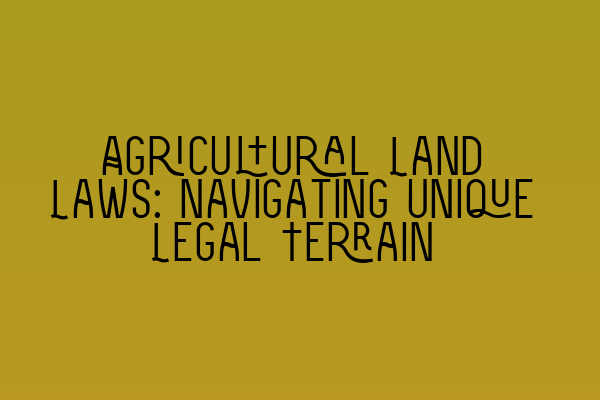Agricultural Land Laws: Navigating Unique Legal Terrain
Welcome to another informative and educational blog post from SQE Property Law & Land Law. Today, we will be delving into the intricate world of agricultural land laws. As a solicitor and expert in property law, I understand that navigating this unique legal terrain can be a challenging task. However, fear not! With the right guidance and knowledge, you can successfully navigate through the complexities of agricultural land laws.
Before we dive deeper, it’s worth noting that staying up-to-date with the latest developments in property law is crucial. To get a better understanding of this topic, I highly recommend reading our SQE Preparation for Property Practice: Mapping Out Your Strategy article. It provides valuable insights into preparing for property law practice, helping you to navigate various legal terrains with ease.
The Importance of Agricultural Land Laws
Agricultural land laws play a vital role in regulating and protecting the rights and interests of farmers, agribusinesses, and the agricultural community as a whole. They provide a framework for land use, ownership, and agricultural practices, ensuring both sustainability and profitability in the industry.
It’s crucial for anyone involved in agricultural land transactions or operations to have a solid understanding of agricultural land laws. This knowledge helps ensure compliance and mitigates legal risks that may arise from disputes or non-compliance.
Agricultural Tenancies
One key aspect of agricultural land laws is agricultural tenancies. These tenancies govern the relationships between landlords and tenants in the agricultural sector. Understanding the rights and responsibilities of both parties is critical to avoid misunderstandings and potential conflicts.
For a more comprehensive guide on legal challenges in property transactions, including agricultural tenancies, check out our article on Legal Challenges in Property Transactions: A Comprehensive Guide. It offers a wealth of information to help you navigate through complex property transactions.
Common Agricultural Land Issues
In agricultural land transactions, various issues can arise. Some common concerns include rights of way, land drainage, boundary disputes, and access to water sources. By familiarizing yourself with these issues and their legal implications, you can safeguard your interests and ensure a smooth transaction process.
Stay updated with the latest changes in UK property laws by reading our article on Updates in UK Property Laws: Key Changes and Implications. This resource will keep you informed about any recent updates that may impact agricultural land laws.
Exploring Agricultural Land Planning Permission
When it comes to developing or changing the use of agricultural land, obtaining the necessary planning permission is essential. Planning regulations play a significant role in managing the balance between agricultural practices and urban development. Understanding the intricacies of planning permission can help you avoid potential legal obstacles and delays in your projects.
If you’re interested in learning more about navigating lease laws in the UK, our article on Navigating Lease Laws in the UK: Essential Guidelines for Tenants and Landlords is a must-read. It covers crucial guidelines pertaining to leases, which can be particularly relevant when dealing with agricultural land agreements.
Agricultural Subsidies and Grants
One other essential aspect of agricultural land laws is the availability of subsidies and grants to support the agricultural community. Governments provide financial incentives to encourage sustainable farming practices and support farmers in their operations. Understanding the eligibility criteria and application processes for these incentives can significantly benefit those involved in the agricultural industry.
Compliance and Future Developments
As with any area of law, compliance with agricultural land laws is crucial. Failure to comply can lead to legal disputes, fines, or even the loss of land rights. It’s essential to stay vigilant and keep yourself updated on any changes or future developments in agricultural land laws.
Finally, to better prepare for any property law questions that may come your way, our article on Dominate Property Law Questions: Avoiding Common Pitfalls offers invaluable insights and tips to help you avoid common pitfalls and ensure success in your legal career.
Conclusion
As a solicitor at SQE Property Law & Land Law, I understand the importance of navigating the unique legal terrain of agricultural land laws. By thoroughly understanding the intricacies of these laws and staying up-to-date with developments in the field, you can ensure compliance, protect your interests, and make informed decisions.
For any legal assistance or further inquiries related to agricultural land laws or property law in general, do not hesitate to reach out to our expert team at SQE Property Law & Land Law. We are here to support and guide you on your property law journey!
